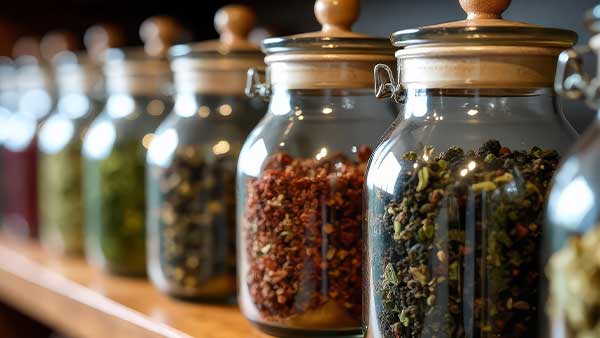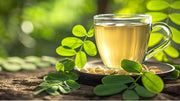How Long Do Herbal Teas Last? Your Complete Guide

Shelf Life, Storage, and Freshness
Ever discover a forgotten pouch of herbal tea in the back of your cupboard? You may have wondered: Is this still good to drink? Unlike perishable foods that spoil quickly, herbal teas don’t “go bad” in the sense of becoming unsafe. However, they can lose their flavor, aroma, and beneficial properties over time.
The shelf life of herbal tea depends on a few factors. These include:
- Is it loose leaf or in tea bags?
- What type of herbs does it contain?
Most importantly:
- How are you storing your herbal tea?
Read on to discover how long herbal teas typically last. Learn to recognize the signs show your tea has gone stale as well as how to properly store them to maximize freshness.

Do Herbal Teas Expire?
Technically, dried herbs don’t “expire” in the same way fresh produce or dairy products do. When dried and stored correctly, herbs are remarkably shelf-stable. However, they do degrade over time, losing potency, fragrance, and taste.
For those who enjoy tea, this implies that older teas might not provide the calming scent, rich taste, or health advantages you anticipate. Drinking stale tea is a bit like eating day-old bread—it’s not dangerous, but it isn’t nearly as enjoyable.
How Does the Shelf Life of Herbal Tea Compare to the Shelf Life of Black Tea or Green Teas?
Herbal teas can last anywhere from 6 months to 2 years, depending on the type and storage conditions. This variability is due to the diverse range of herbs used in herbal teas, each with its own characteristics.
Black tea typically has a longer shelf life than herbal tea. Black tea can last 2–3 years when stored properly, while green tea usually lasts about 1–2 years.
The main difference lies in the processing methods. Black tea leaves undergo full oxidation, which aids in the retention of their flavor and aroma. In contrast, green tea is lightly processed, necessitating proper storage.

Typical Shelf Life of Herbal Teas
Loose Leaf Herbal Tea
- Shelf life: 1–2 years
- When compared to other forms of herbal tea, loose leaf herbal teas tend to stay fresh longer. Loose leaf tea contains larger pieces of dried herbs and botanicals, which retain oils and flavor compounds better than finely ground blends.
Herbal Tea Bags
- Shelf life: 6–18 months
- Tea bags often contain smaller particles of herbs (known as “fannings” or “dust”), which lose flavor more quickly. They are also packaged in porous paper, exposing them to more air and moisture.
Pre-Blended or Flavored Herbal Teas
- Shelf life: 6–12 months
- Blends that include added flavors, essential oils, or fruit pieces may degrade faster than pure single-herb teas. Citrus peel and dried fruit can lose potency sooner.
Fresh or Homemade Herbal Teas
- Shelf life: Just a few days in the refrigerator
- Fresh tea made directly from herbs (like mint leaves from your garden) should be consumed within 2–3 days. The fresh plant material can spoil quickly, even when chilled.
How to Tell If Herbal Tea Has Gone Stale
While herbal teas don’t usually become dangerous when old, there are some signs that indicate it’s time to toss them:
- Faded Aroma – Fresh herbal teas are fragrant. If your chamomile no longer smells floral or your peppermint no longer smells crisp, it’s past its peak.
- Weak Flavor – A stale tea will brew into a pale cup with little taste.
- Color – Herbs that were once bright green, red, or golden may turn dull and brown.
- Mold or Unusual Odor – Rare, but if you detect mustiness or see visible mold, discard the tea immediately.

Factors That Affect Shelf Life
Several variables influence how long herbal teas last:
- Exposure to Light – UV rays can degrade delicate herbal compounds, leading to loss of potency.
- Air and Oxygen – Oxidation dulls aroma and taste, especially in porous tea bags or unsealed containers.
- Moisture – Even small amounts of moisture, such as humidity, can trigger mold or bacterial growth in dried herbs.
- Heat – Warm storage conditions speed up chemical breakdown and flavor loss.
- Quality of Ingredients – Higher-quality herbs, harvested and dried properly, retain freshness longer than low-grade bulk herbs.
Best Practices for Storing Herbal Tea
To extend the shelf life of your herbal teas, follow these simple storage tips:
- Use Proper Storage – Airtight Containers, ceramic canisters, or metal tins keep air and moisture out. While glass jars may look beautiful on a kitchen shelf, they’re not the best choice for storing loose herbal tea. Glass allows light to pass through. Over time, exposure to sunlight or even indoor lighting can degrade delicate herbs. This exposure can strip away the color, flavor and aroma. For long-lasting flavor, it’s best to admire your teas while brewing them—not through a clear jar on the counter.
- Keep Away from Light – Store your teas in opaque containers or in a cool, dark cupboard.
- Avoid Heat Sources – Don’t keep teas above the stove, near the oven, or in direct sunlight.
- Store in Smaller Batches – If you buy in bulk, portion teas into smaller containers and only open one at a time.
- Avoid Fridge or Freezer Storage – The refrigerator doesn’t make everything stay fresher. Refrigeration and freezing can introduce condensation each time you open the container, which damages the herbs.
Can You Drink Expired Herbal Tea?
If your tea is a little past its “best by” date but still smells and tastes fine, it’s generally safe to drink. However, if you notice any of the spoilage signs mentioned earlier, it’s best to replace it.
One creative way to use older (but still safe) herbs is to repurpose them:
- Add them to potpourri mixes.
- Use them in homemade bath soaks or scrubs.
- Compost them if they no longer taste appealing.
Tips for Buying Fresh Herbal Tea
- Choose whole-leaf teas – They last longer than ground or dust-grade teas.
- Buy from reputable sources – Specialty tea shops or trusted online retailers often sell fresher stock than grocery store shelves.
- Purchase the right amount – If you drink a lot of tea daily, you will likely consume the tea long before any worry of expiration. Otherwise, buy in modest quantities to ensure you finish them while fresh.
Conclusion
Herbal teas don’t spoil in the traditional sense. However, their shelf life is limited when it comes to taste, aroma, and potency. The key to keeping your teas fresh is protecting them from light, heat, moisture, and air.
So, next time you unearth a forgotten tin of peppermint or chamomile, give it a smell and taste test. If it’s still fragrant and flavorful, brew away. If not, it may be time to refresh your collection with a new batch of vibrant, aromatic herbs.
With the right storage habits, you’ll enjoy the full sensory experience of your herbal teas—and never have to wonder if they’re past their prime.






